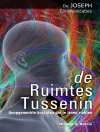As he seeks answers to life’s deepest questions, a pilgrim experiences seemingly chance meetings with an atheist, a social activist, Catholic monks, and others. While accompanying the pilgrim on his journey, the reader finds his own mind expanding, and discovers a universal and liberating life philosophy.
Über den Autor
One of the foremost spiritual teachers of Yoga principles in the world. In 1948, at the age of twenty-two, he became a disciple of the Indian yoga master and world teacher, Paramhansa Yogananda (author of the classic, Autobiography of a Yogi). At Yogananda’s request, Swami Kriyananda devoted his life to teaching and writing, and helping others to experience the joy and living presence of God within. Over the course of more than sixty years, Kriyananda lectured on four continents in seven languages. His television programs, audio and video recordings of his talks and music, and his many books in twenty-eight languages have touched the lives of millions.
Swami Kriyananda took the ancient teachings of Raja Yoga and made them intensely practical and immediately useful for people in every walk of life, on a daily basis. His books and teachings cover nearly every field of human endeavor, including spiritualizing business life, leadership, education, the arts, community life, and science. He wrote extensive commentaries on the Bible and the Bhagavad Gita.
Swami Kriyananda was also known as the “father of the intentional communities movement, ” which began in the United States in the late 1960s. Inspired by his guru’s dream of establishing spiritual communities, in 1968 he founded the first of what are now ten Ananda communities worldwide. They provide a supportive environment of “simple living and high thinking, ” where a thousand full-time residents live, work, and worship together. “The time has come for people to live lives of even higher dedication than that which inspired monks and nuns of the past. . . . The time has come for people to direct their spiritual awareness als’ downward into matter . . . to everything they do: their work, to education, to family life, to friendship, to their communications with strangers, to the way they build their homes — to all the most mundane, practical aspects of daily, human life."












